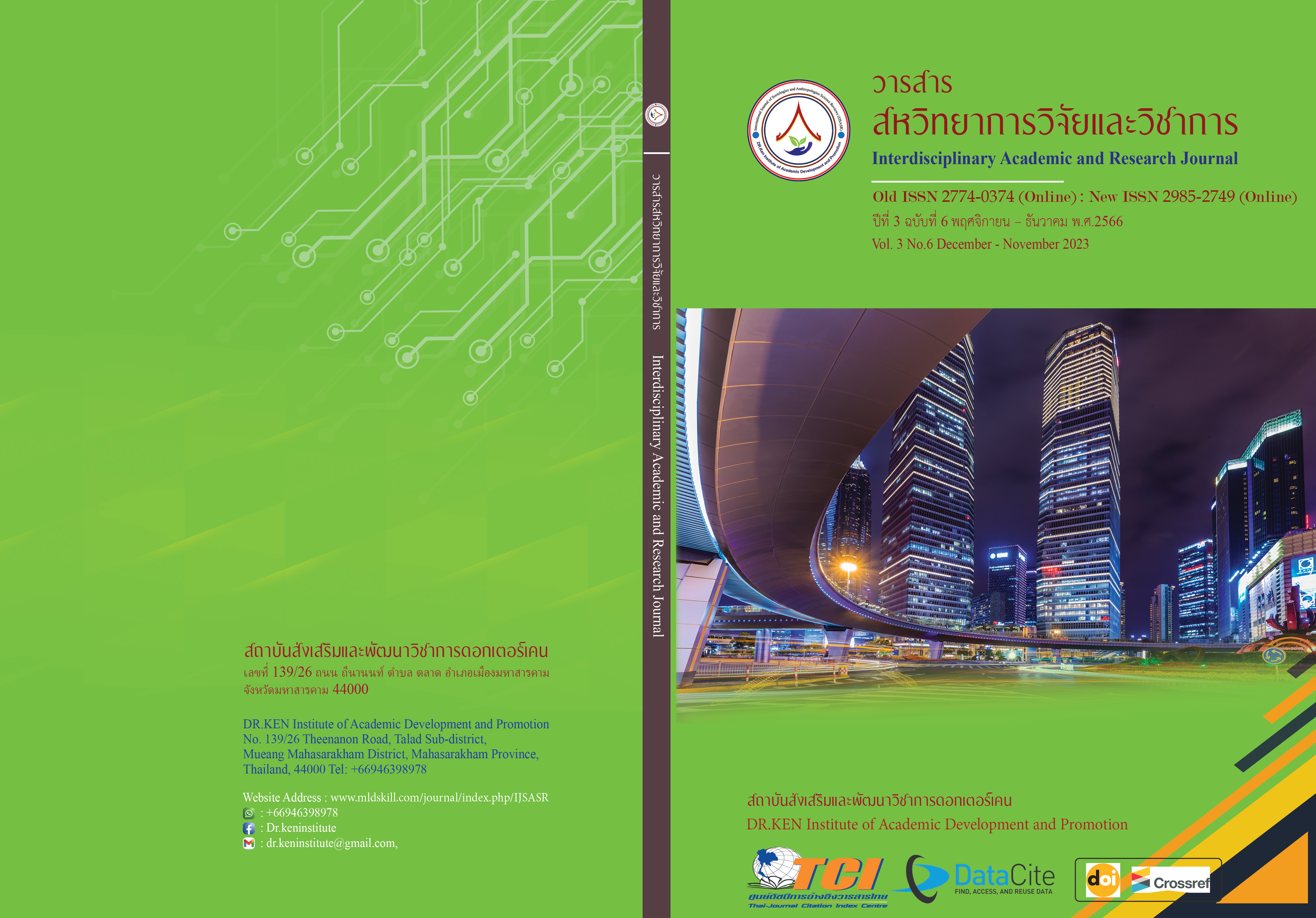A Construction of Outcome-Based Education Model for Basketball Skills Course in Junior High School at Thawi Watthana District
DOI:
https://doi.org/10.60027/iarj.2023.272536Keywords:
Results-Oriented Teaching Model; , Basketball SkillsAbstract
Background and Aims: Outcome-based education is an educational concept that emphasizes goals or outcomes at the end of a period of instruction. Every student must put the knowledge into practice correctly and appropriately. The objectives of this study aimed to develop and construct a teaching model for outcome-based education in the course basketball skills of junior high school students in the Thawi Watthana district. Methods:
Methodology: The research work is divided into four phases. Phase 1: study basic information problems in organizing teaching and learning construction teaching model outcome-based education in the course basketball skills of junior high school students in Thawi Watthana district from 309 students and 30 teachers in the physical education category Phase 2: Interviewing seven experts to develop a draft model Phase 3: Create a teaching model using the Delphi method from a total of 19 experts, divided into 2 rounds. Phase 4: Image evaluation from 7 experts for construction teaching model outcome-based education in the course basketball skills of junior high school students in Thawi Watthana district.
Results: Analysis revealed the need for a comprehensive basketball teaching model with four primary elements (basketball theory, basketball skills, physical adaptability, and social adaptability), further divided into 12 secondary and 34 tertiary elements. Each segment is tailored to specific outcome objectives, emphasizing cognitive understanding, skill mastery, physical fitness, and social adaptation. Discussion: Construction teaching model outcome-based education in the course basketball skills of junior high school students in Thawi Watthana district. The curriculum fosters not only the enhancement of basketball-specific knowledge and skills but also promotes overall student development, accentuating theoretical comprehension, practical application, physical well-being, and social adaptability.
Conclusion: The outcome-oriented teaching approach in the junior high school basketball skills course in the Thawi Watthana district emphasizes a two-tier model, focusing on basketball theory and skills. The model aims to cultivate expertise that can be applied in team play, enhancing physical fitness and social adaptability.
References
มณีญา สุราช. (2560). การวัดและประเมินผลการศึกษา. คณะคุรุศาสตร์, มหาวิทยาลัยราชภัฏอุดรธานี.
วรศักดิ์ เพียรชอบ. (2560). รวมบทความเกี่ยวกับปรัชญา หลักการ วิธีสอน และการวัดเพื่อประเมินผลทางการพลศึกษา. พิมพ์ครั้งที่ 2. กรุงเทพ: สำนักพิมพ์แห่งจุฬาลงกรณ์มหาวิทยาลัย
วัชชริน ผดุงรัชดากิจ. (2552). หนังสือคู่มือกีฬาบาสเกตบอลไทยสำหรับสื่อมวลชน. ดุษฎีนิพนธ์ปรัชญาดุษฎีบัณฑิต, สาขาวิทยาศาสตร์การออกกำลังกายและการกีฬา, คณะวิทยาศาสตร์การกีฬา, มหาวิทยาลัยบูรพา.
วิทยา วรพันธุ์, สินธะวา คามดิษฐ์ และ ปาณิสสา ตรวจสูงเนิน. (2562). หลักสูตรตามแนวทางการศึกษาที่มุ่งผลลัพธ์ หมวดวิชาศึกษาทั่วไปมหาวิทยาลัยมหาสารคาม. โครงการประชุมทางวิชาการและเผยแพร่ผลงานวิจัยคัดสรร สาขาวิชาศึกษาศาสตร์ระดับชาติ : การจัดการศึกษาเพื่อการเรียนรู้ตลอดชีวิต, น.413-424
สมชาย เทพแสง, กันต์ฐมณีญา นฤโฆษกิตติกีรติ และอัจฉริยา เทพแสง. (2566). การศึกษาที่เน้นผลลัพธ์ Outcome-based Education (OBE): กุญแจสำคัญในการจัดการเรียนรู้ที่มุ่งเน้นนักเรียนเป็นหลัก. วารสารสหวิทยาการวิจัยและนวัตกรรมการศึกษา, 2(1), 39-52.
สำนักการศึกษากรุงเทพมหานคร. (2565). ข้อมูลพื้นฐานโรงเรียนในสังกัดสำนักการศึกษากรุงเทพมหานคร. กรุงเทพฯ: สำนักการศึกษากรุงเทพมหานคร
สุริยา วิทยาประดิษฐ์ (2561). รูปแบบการสอนตามแนวทางการศึกษามุ่งผลลัพธ์เป็นฐานสำหรับวิชาอิเล็กทรอนิกส์ชีวแพทย์ของมหาวิทยาลัยเทคโนโลยีมหานคร. ENGINEERING TRANSACTIONS, 21(1), 90-98.
Davis, M. (2003). Outcome-Based Education, JVME, 30(3), 258-263.
Hafiz, M.A., Anthony, V., Ashfaq, A. & Samreen, S. (2021). A Review on Outcome Based Education and Factors That Impact Student Learning Outcomes in Tertiary Education System. International Education Studies, 14(2), 1-11.
Hoffman, J. R. (2003). Physiology of basketball. In D.B. McKeag (Ed.), Basketball (pp. 12-24). Oxford: Blackwell Science.
Japee, G.P., & Oza, P. (2021). Curriculum and Evaluation in Outcome-Based Education. Psychology and education, 58(2), 5620-5625.
Khairul, U., Demmu, K., Wesly, S., & Irfan, M. (2022). Outcome-Based Education Design in Elementary School Physical Education Lectures. Jurnal pendidikan jasmani (JPJ), 3(2), 72-79.
Maharaj, S., & Ramya, K.R. (2011). Outcome-Based Education. International Journal of Nursing Education, 3(2), 87-91.
Yusoff, Y.M., Fuaad, N.F.A., Yasin, R.B.M., & Tawil, N.M. (2014). Achievement of program outcomes in outcome-based education implementation—a meta-analysis. Paper presented at the Proceedings of the 2014 International Conference on Industrial Engineering and Operational Management, Bali, Indonesia. 1739-1749.
Downloads
Published
How to Cite
Issue
Section
License
Copyright (c) 2023 Chuchat Supsutthiphon, Chanchai Siriphan

This work is licensed under a Creative Commons Attribution-NonCommercial-NoDerivatives 4.0 International License.
Copyright on any article in the Interdisciplinary Academic and Research Journal is retained by the author(s) under the under the Creative Commons Attribution-NonCommercial-NoDerivatives 4.0 International License. Permission to use text, content, images, etc. of publication. Any user to read, download, copy, distribute, print, search, or link to the full texts of articles, crawl them for indexing, pass them as data to software, or use them for any other lawful purpose. But do not use it for commercial use or with the intent to benefit any business.
















.png)


